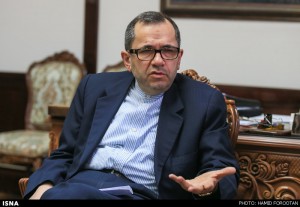 Tehran, Feb 26, IRNA � Senior member of Iran?s nuclear negotiating team said that after nuclear agreement, an intensive competition atmosphere has been created for establishing ties with Iran.
Tehran, Feb 26, IRNA � Senior member of Iran?s nuclear negotiating team said that after nuclear agreement, an intensive competition atmosphere has been created for establishing ties with Iran.
Speaking in a live TV interview on Tuesday evening, Majid Takht-e-Ravanchi said that after the agreement, foreign ministers, industrialists, and parliamentary delegations from different European countries have travelled to Iran.
He said that nuclear talks had priority for the Foreign Ministry, so after progress in negotiation, the ministry paid attention to ties with the Latin America.
Ravanchi continued that Iran?s nuclear negotiating team is not authorized and not following establishment of bilateral ties with the USA.
He added that Iran, since the beginning, has underlined a constructive interaction with the world and continued that relations with the USA has special condition and they should talk with us in an equal stance and should not interfere in Iran?s domestic affairs.
Concerning bilateral and multilateral ties with the other countries, Ravanchi said there is more place for cooperation with the European states.
He stressed that negotiation with the USA is not on the agenda and our talks with them is just in the framework of nuclear issues.
Concerning the most important axis of the final step of talks between Iran and Group 5+1, Ravanchi said that basis of the talks is Geneva agreement and enrichment, limitation of enrichment, capacity, Arak Heavy Water, lifting of sanctions are among axes of the final step and after that Iran?s dossier will return to the normal case.
Deputy Foreign Minister in Europe and American Affairs said that according to the Geneva agreement, all imposed resolutions against Iran should be considered again, because Iran considrs them as cruel and unjust and does not accept them.
He said that prediction is difficult, but we as diplomats should work with optimism and good will, but if the other side presents issues other than agenda and the context of the Geneva agreement, it will make the work difficult.
Ravanchi continued that we have red lines, which we should not pass them and we have declared them clearly to the other side.
Referring to the westerners? pressures on the issue of research and development, including development of centrifuges, he said we are so serious on this issue, because it is related to our future and we cannot deprive our future generation from whatever is their right.
Ravanchi added that many countries are members of Non-Proliferation Treaty (NPT), some of them are enriching uranium in their countries and some others do not have it. Some countries have nuclear arsenal and the others have not, but are members of the NPT.
After the final step is completed and all sanctions are lifted, Iran?s dossier will turn to a normal case, like Japan, which will be under control and supervision of the International Atomic Energy Agency (IAEA).
He underlined that in the framework of IAEA?s regulations, we continue our peaceful nuclear activity, research and development, enrichment issue inside the country for peaceful use.
The Iranian senior diplomat said that concerning our commitment, the latest reports of the IAEA indicated that Iran had been committed to its duties in the first step agreement in relation with the Geneva agreement everything is being implemented smoothly and we have not faced with any complicated problem.
Concerning visit of EU foreign policy chief Catherine Ashton to Iran, Ravanchi said that the exact date is not clear yet, but it will certinly be before next round of talks in Vienna on March 17.
Ashton will visit Iran as the EU foreign policy chief and not on behalf of Group 5+1, and she will discuss important issues here, which nuclear issue would be one of them.
Takht-e-Ravanchi concluded that the visit is very important and is a new move between Iran and European countries and we are waiting for conformation of the exact date by the Ashton office.
By IRNA
The Iran Project is not responsible for the content of quoted articles.

 QR code
QR code